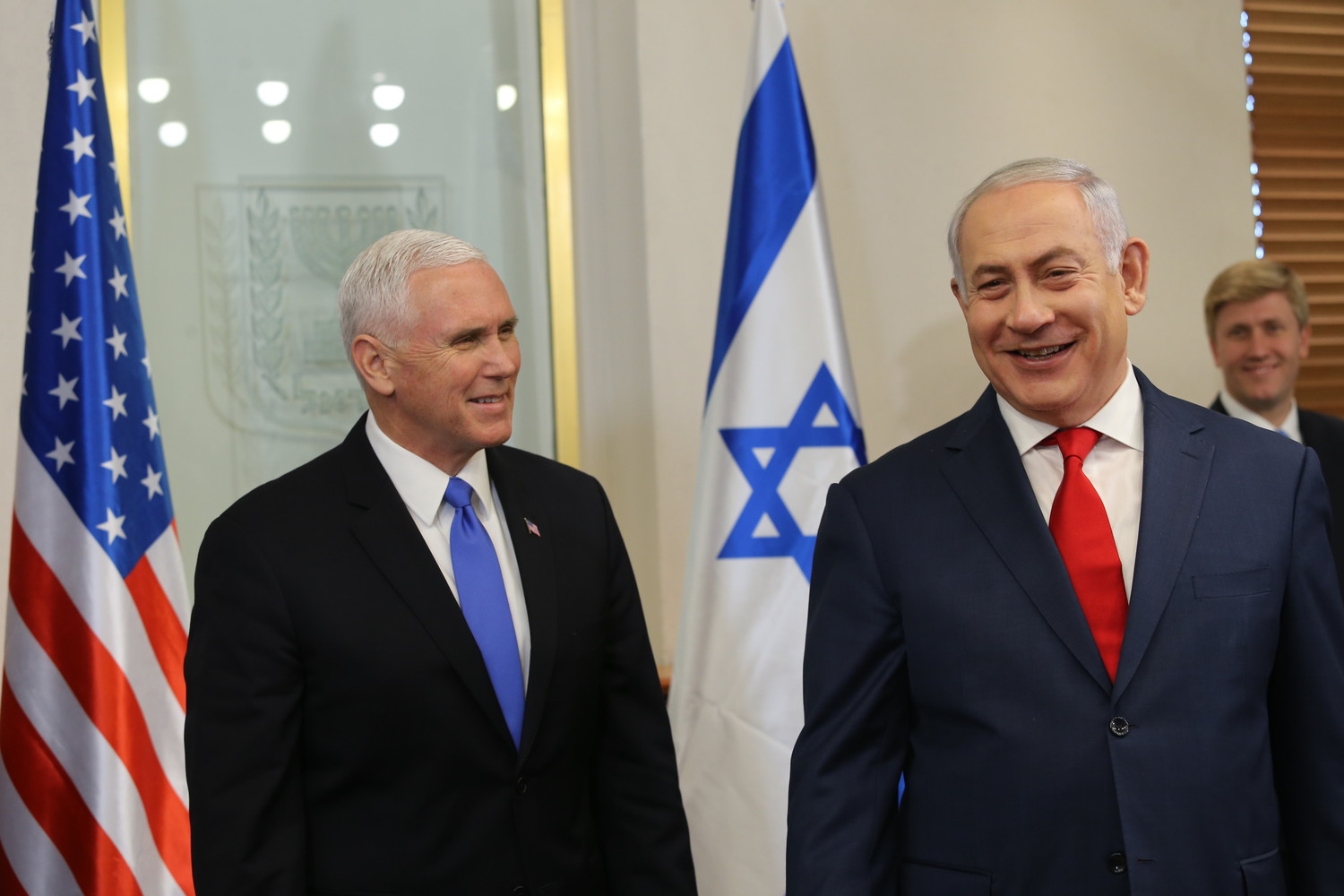Pence vows: Next year in Jerusalem!
Recites Shehecheyanu prayer in the Knesset
Vice President Mike Pence promised the Knesset on Monday that the U.S. Embassy would move to Jerusalem “before the end of next year,” advancing the timeline of several years that was originally suggested by Washington.
Click here to read the text of Vice President Pence's Knesset speech.
Anticipating celebrations in April that will mark the 70th birthday of the modern state of Israel, Pence recited the Shehecheyanu prayer in broken Hebrew, earning him one of at least a dozen standing ovations from the lawmakers.
“As I stand in Abraham’s ‘Promised Land,’ I believe that all who cherish freedom, and seek a brighter future, should cast their eyes here to this place and marvel at what they behold,” Pence said.
His address was a historic milestone, the first by a U.S. vice president to the Israeli parliament.
Pence referred to President Trump, who in December extended U.S. recognition to Jerusalem as Israel’s capital and said the U.S. would move its embassy there from Tel Aviv, as “a leader who has done more to bring our two great countries closer together than any president in the past 70 years.”
“America stands with Israel,” the vice president said. “We stand with Israel because your cause is our cause, your values are our values, and your fight is our fight. We stand with Israel because we believe in right over wrong, in good over evil, and in liberty over tyranny. We stand with Israel because that’s what Americans have always done, and so has it been since my country’s earliest days.”
Pence called the decision to recognize Jerusalem as Israel’s capital “in the best interest” of peace, saying that “fact is the only basis for peace.” He stressed that such recognition does not change the status quo arrangements on holy sites in the city and that the United States has not taken a position on final status issues such as borders.
He reaffirmed that “if both sides agree, the United States of America will support a two-state solution,” and praised Israel for being willing to come to the peace table. The U.S. “strongly urge(s) the Palestinian leadership to return to the table,” he said. “Peace can only come through dialogue.”
Pence called the Iran nuclear deal a “disaster” and said that the U.S. “will no longer certify this ill-conceived agreement.”
He vowed that the United States would join Israel to fight Iran and said the U.S. would never allow Iran to achieve a nuclear weapon. “Unless the Iran nuclear deal is fixed, President Trump has said the United States will withdraw from the Iran nuclear deal immediately,” her said.
Pence asserted that “radical Islamic terrorism knows no boundaries” and called for the destruction of ISIS at its source. He added that the U.S. has committed more than $110 million to help Christians and other religious minorities in the Middle East to rebuild after years of repressive wars, and called on Israel and others to join the effort to restore a “rich diversity” to the region.
Pence cited passages from the Bible and alluded to biblical history, as well as to parallels between the founding of the United States and Israel, many times during his 30-minute address. He praised Israel for returning “to the land which your fathers possessed.”
As he began to speak, Arab-Israeli lawmakers from the Joint Arab List alliance began waving signs protesting the U.S. recognition of Jerusalem as Israel’s capital, leading to their expulsion from the Knesset chamber.
Among those in the Knesset chamber for the speech were the U.S. ambassador to Israel, David Friedman; Israel’s ambassador to the United States, Ron Dermer; and the U.S. special envoy to the Middle East, Jason Greenblatt.
Prior to his speech to the Knesset, Pence met with Prime Minister Benjamin Netanyahu at the prime minister’s office in Jerusalem.
Following that meeting, in remarks to reporters, Pence called it “my great honor, on behalf of the president of the United States, to be in Israel’s capital, Jerusalem, following on the president’s historic decision.”
He said that he was “hopeful that we are at the dawn of a new era of renewed discussions to achieve a peaceful resolution to the decades-long conflict that has affected this region.”

 48.0°,
Light Rain
48.0°,
Light Rain 




